Archived Commercial Blog Posts
Leave Puffback Soot Cleaning to the Professionals
10/11/2022 (Permalink)
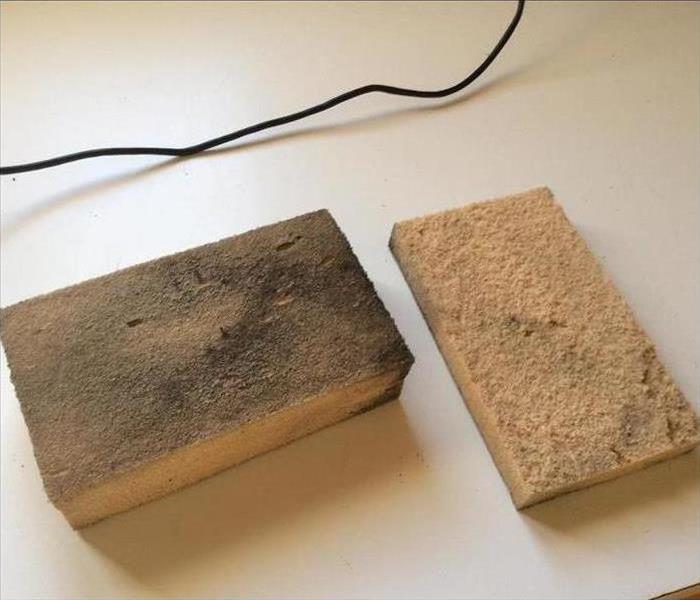 Don't clean puffback soot yourself
Don't clean puffback soot yourself
When you are cleaning your home, you want to make sure that the job is done right. You want to make sure that you do not miss anything or do anything incorrectly. You may even consider doing some of the work yourself and saving some money in the process. However, there are times when it is better to leave a task up to someone else who has more experience than you do. Such is the case with puffback soot damage on walls: if left unaddressed, this damage could spread easily through your home and into other rooms and areas of your home over time.
What is Puffback?
Puffback occurs when the oil burner is not operating properly. It can cause damage to your walls and is potentially dangerous if you attempt to clean it yourself. Your best course of action if you are experiencing puffback is to contact your local HVAC professional, who will be able to inspect the system and make any necessary repairs.
Cleaning Puffback Damage
If you’re dealing with a puffback soot stain in your home, there are several steps you can take to clean up and remove the mess. First, use a damp cloth to wipe away any loose particles of soot that may be hanging around on your walls. Then, vacuum the area thoroughly with a vacuum hose attachment to get rid of any remaining particles and dust.
Next, wash the walls with a mild detergent diluted in water—this will not only clean off any remaining soot but also restore their original color! To dry them off after cleaning: wring out excess moisture from a soft cloth then use this cloth to gently pat down each wall until it’s dry (or nearly dry). Finally, if it seems like there are still remnants left behind after washing or drying—even after vacuuming—you might want to call in professionals for an inspection.
Of course, the better option is to call the professionals at SERVPRO of Montclair/West Orange to handle the entire process from start to finish.
Cleaning Puffback Smoke is Dangerous
Not only is it dangerous and unhealthy to clean puffback soot yourself, but it can also be bad for your home. When you do the work yourself, you risk damaging your walls and other surfaces. In addition, if you don't have experience cleaning soot from the ductwork of your furnace or fireplace, then there's a chance that you'll accidentally damage the unit itself. For example: Some models of furnaces require a certain type of filter called an electrostatic filter or electronic filter in order to operate properly or at all. If this filter is damaged during dusting or vacuuming (for example), then it won't function correctly anymore. That means that this part needs replacing—and that costs money!
As you can see, puffback soot is not something to play around with. You do not want to risk your health and safety by cleaning the walls yourself. It is best to hire an expert who will know how to handle this dangerous substance properly, so they can ensure your family’s safety and property remain undamaged during cleanup.
4 Tips for Removing Standing Water From Your Building
8/29/2022 (Permalink)
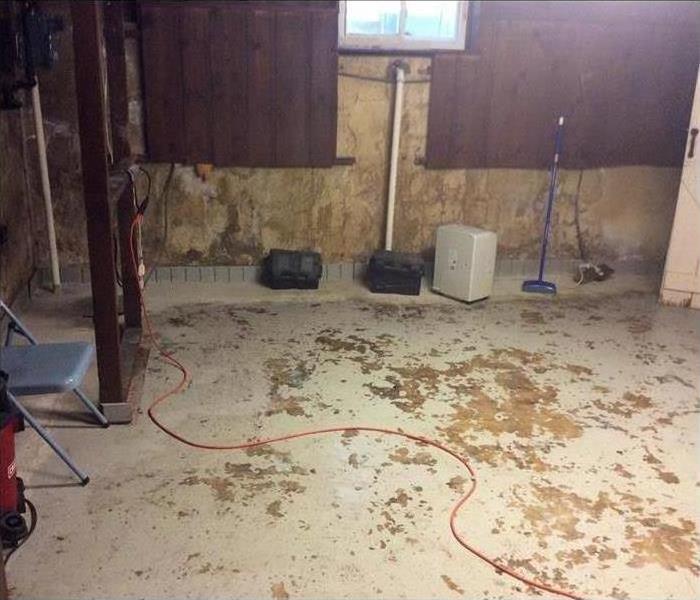 Basement flood cleanup.
Basement flood cleanup.
How Do I Remove Standing Water From My Property?
Storms in Llewellyn Park, NJ, can bring a lot of water with them. With so much excess water, it's not all that surprising when your commercial building ends up with standing water in its lower levels. Even though it is not a shock, it can still be a challenge to deal with. Working with a team that has the specialized equipment needed to remove standing water can make this entire process a little easier. Keep these four tips in mind as you try to tackle this remediation.
1. Call in the experts. Your first step should be to call in a commercial storm damage repair team. This crew of professionals can help you remove standing water, repair damage, and prevent the same flooding from happening again. The teams can also make sure the project is done quickly.
2. Consider the water. If your basement is full of plain water, you may be able to use a simple pump to suck the floods out of the space. However, if there's any sludge mixed in with the liquid, you may need to turn to a trash pump instead.
3. Remove all humidity. Once you have the standing water out of your building, the project isn't quite over. You still need to make sure all of the excess moisture is sucked from your space. Using special equipment, such as a dehumidifier, can help with this task.
4. Install a new pump. If you have a sump pump in your basement, you may need a new one after dealing with a two-foot flood. If you didn't have a pump, installing one may help you avoid more flooding in the future.
You can never predict what type of damage a storm is going to do to your commercial building. You can, however, make sure you work with a trained team that has access to a wide range of equipment if your property is affected by a storm.
Why Mold Keeps Coming Back and What To Do About It
6/1/2022 (Permalink)
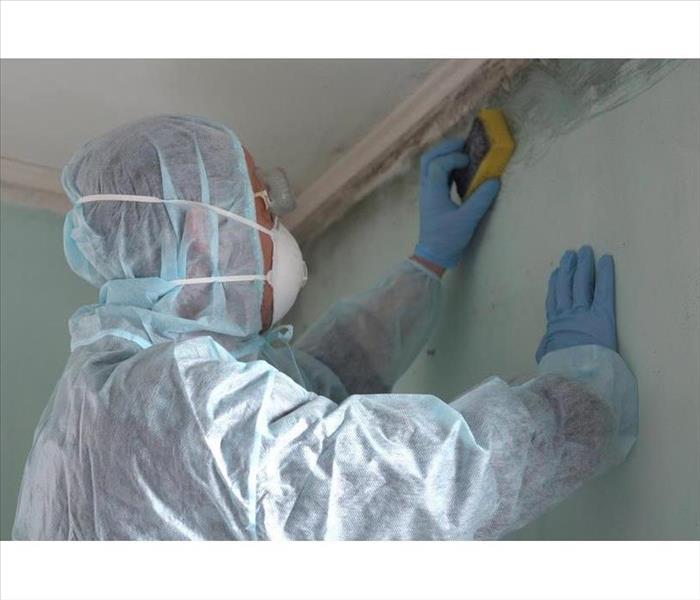 SERVPRO has a team certified to handle mold of all colors. We have the right equipment to clean it up, call us.
SERVPRO has a team certified to handle mold of all colors. We have the right equipment to clean it up, call us.
What Causes Mold Recurrence And What You Can Do About It
The second you discovered mold growth under a potted plant in the corner of the office, you jumped into action. You removed the plant, deep cleaned the area, and replaced the carpet. But a few months later, you noticed a mildew smell in the same spot. The mold is back! Repeat efforts gained the same result—returning mold. Now what?
Reasons Mold Returns
Mold is everywhere—indoors and outdoors. Spores settle in places where there is high humidity and moisture. If mold continues to return to the same spot, it is likely a sign of a leak or more extensive water damage than you previously realized. Although you replaced the carpet under the plant, the subfloor could be holding moisture. There could also be a leaking pipe behind the wall near the plant where mold is happily continuing to grow.
How To Prevent Mold Regrowth
Long-term mold prevention might require some effort and expense up front. The most important thing to know is that mold is very difficult to clean entirely without the proper training and tools. Therefore, the very best option for getting ahead of mold growth is to call a commercial mold damage specialist in Upper Montclair, NJ to come and evaluate your building:
- Evaluation: The professionals will use special tools, such as thermal imaging cameras, to look for potential leaks behind the walls.
- Containment: They will seal off the affected area and clean thoroughly.
- Removal: Any damaged materials will be securely removed from the premises to prevent the spread of mold spores.
- Restoration: Areas that have damage will be completely restored. This could be as simple as new dry wall after fixing a leak, or a more extensive reconstruction of an area that is susceptible to continued water damage.
Battling mold growth, whether in a small area or a large one, is a big job that is best left to the professionals for the long-term benefit of your business.
5 Ways To Protect Your Business From Flood Damage
4/18/2022 (Permalink)
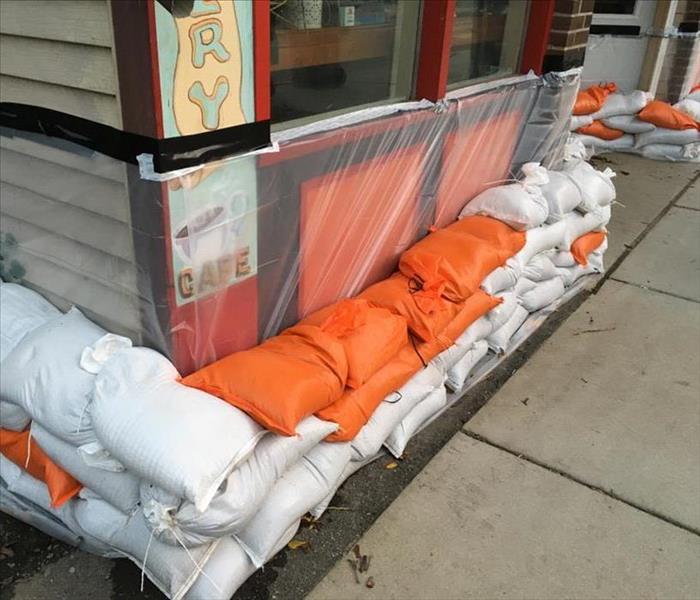 Owners have the power to minimize flood damage, but it requires forward-thinking and proactive approaches.
Owners have the power to minimize flood damage, but it requires forward-thinking and proactive approaches.
5 Ways To Prevent Flood Damage To Your Business
Commercial owners in Montclair NJ, do not have the ability to stop Mother Nature's rising waters; however, proprietors do have the authority to fight off flood damage. By taking time to evaluate the property, it's possible to minimize harm. The following are five ways to take action now.
1. Raise the Electrical Outlets
When inclement weather occurs, moisture could infiltrate the building from the roof and through the floor. This storm damage exposes electrical wiring to fluid. To avoid this contamination and the cost of fixing an entire electrical system, consider relocating outlets and major wiring systems to a higher location. Floods can rise use to several feet. Place these openings further up, at least 12 inches above the base flood elevation zone.
2. Invest in Barrier Protection
The incoming water is hard to fight off unless the perimeter has been protected with a watertight product. Keep a supply of sandbags or flood-protective material on hand. Line these around the weaker areas, especially doors and windows. Ensure they are at least 3 feet or more depending on the establishment's placement in the flood zone.
3. Safeguard the HVAC Unit
A ruined HVAC unit is expensive to replace, and it's one of the objects likely to incur flood damage if it sits on the ground at a low level. Move it to the roof or a higher floor.
4. Enhance Landscaping
Ward off flooding by planting flowers and shrubs along the business's perimeter. Use local greenery that thrives in the area's soil. The roots assist in maintaining appropriate soil levels and easing drainage issues.
5. Have a Generator
The sooner a water and flood restoration company begins cleanup efforts, the better. A generator allows for workers to get into the place faster and begin drying out the soaked material.
Owners have the power to minimize flood damage, but it requires forward-thinking and proactive approaches. Be open to changing devices' locations and consider methods to secure the area from water infiltration. Doing these things could save time, stress and money.
3 Things Business Owners Should Know After a Partial Loss From a Fire
1/31/2022 (Permalink)
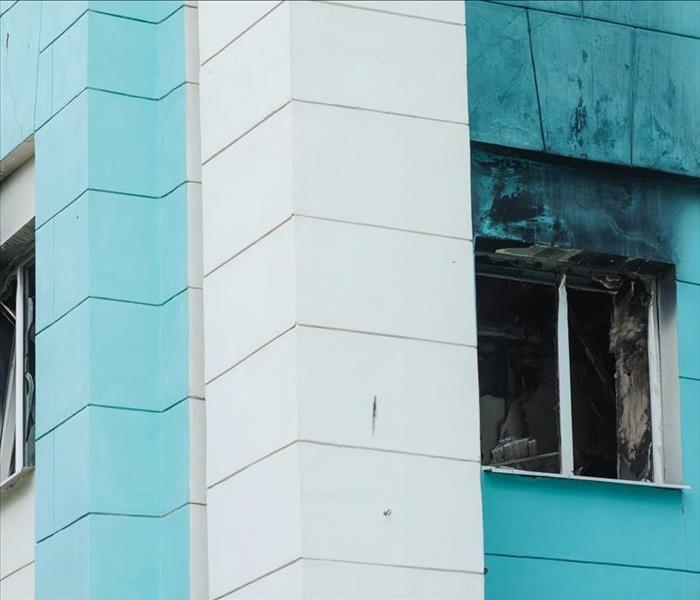 Commercial fire loss in Montclair, NJ.
Commercial fire loss in Montclair, NJ.
What To Expect After a Partial Fire Loss
A fire in Montclair, NJ, can wreak havoc on a business. Fire loss is often one of the first things business owners think about, and many people believe that a partial loss will mean a quick, inexpensive cleanup process. However, this may not be the case, and it can be helpful to know what to expect after a partial loss.
1. An Insurance Claim for Partial Loss Can Be Complex
Although you make an insurance claim after a partial loss, just as you would if fire and smoke damage had affected the entirety of your business, partial losses can make your claim more complex. It can take an extended period of time for an insurance adjuster to determine what items were damaged in the fire and what items weren't affected by the fire. Providing your adjuster with photographs and other forms of documentation of your business before the fire might help to expedite the process.
2. Unseen Damage Is Often Present
With a partial fire loss, people often think that a building has been minimally damaged. Unfortunately, there is often hidden damage associated with partial losses. During a fire, the air quality in a business is often affected by smoke and soot, and though your building's air ducts aren't visible, damage may be present. Additionally, both water and mold damage commonly occur after fires when sprinklers and fire hoses are used to extinguish the flames.
3. Restoration May Still Be Necessary
Though a partial loss from a fire means that some elements of your business are unaffected, restoration may be needed depending on what areas in your business were impacted. If structural elements of your building were damaged in a fire, restoration is often essential. Many business owners find it useful to employ fire restoration experts who can assist in cleanup and restoration.
When considering a fire loss, it's often wise to understand what a partial loss from a fire may involve. By understanding the complications that can come from a partial loss, such as difficulties with an insurance claim, unseen damage and the potential need for restoration, you can better plan for a fire and its effects.
How Does Storm Damage Differ From Flooding?
1/31/2022 (Permalink)
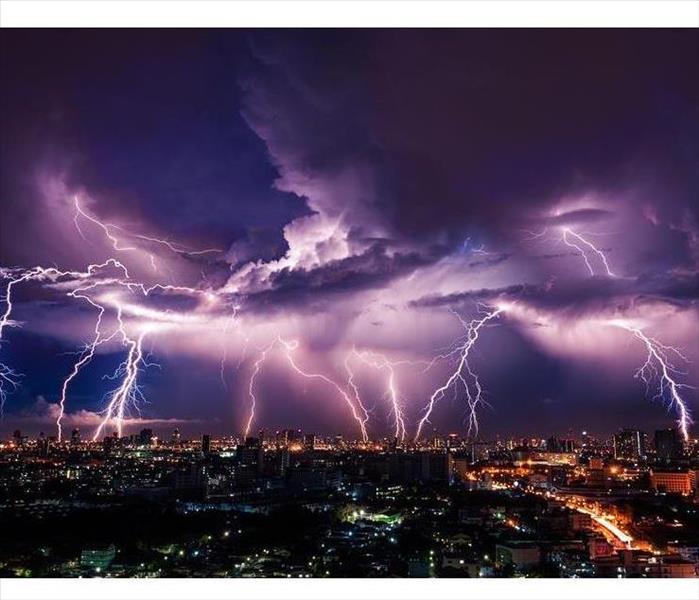 Damage resulting from either flooding or storms can cause severe problems and should be planned for, prevented, and handled as soon as possible.
Damage resulting from either flooding or storms can cause severe problems and should be planned for, prevented, and handled as soon as possible.
What Is The Difference Between Storm Damage And Flooding?
Property owners may have a hard time differentiating storm damage from flood damage. Commercial properties can sustain water damage from either source. There are a few major differences to keep in mind that may help you manage these risks.
Storms Versus Floods
The most general distinction is that storm water comes from above, whereas flood water usually overspills natural bodies or courses of water and covers at least two acres of ordinarily dry land. Storm damage to a commercial property may originate from a variety of causes such as:
- High winds
- Heavy rain
- Hurricanes
- Snow
- Tornadoes
- Tropical storms
Most business insurance plans provide protection from damage caused by storms. Property owners will need additional coverage to offset the expenses of flood damage. If your property is located on a flood plain, you should make sure you carry the policies necessary to protect your investment.
Flooding occurs when water overflows a body of water or watercourse such as:
- Beaches or coasts
- Canals
- Creeks
- Dams
- Lakes
- Stormwater channels
For water to be considered a flood, it must not only cover two acres but affect at least two properties. If a commercial property is located in a high-risk zone and the owner has a mortgage from an insured and federally-regulated lender, he or she is required to maintain flood insurance.
Damage resulting from either flooding or storms can cause severe problems and should be planned for, prevented, and handled as soon as possible. Regardless of the source of moisture, the risk of mold and other secondary damage within a building can be just as severe.
Restoring Damage From Storms and Floods
Restoration specialists can help property owners determine the precise causes of damage and the best solutions. If a commercial property in Montclair NJ experiences flood damage or sustains damage during a storm, contact a commercial damage restoration company as soon as possible.
Smoke Damaged Electronics: Why You Should Always Call a Professional
1/4/2022 (Permalink)
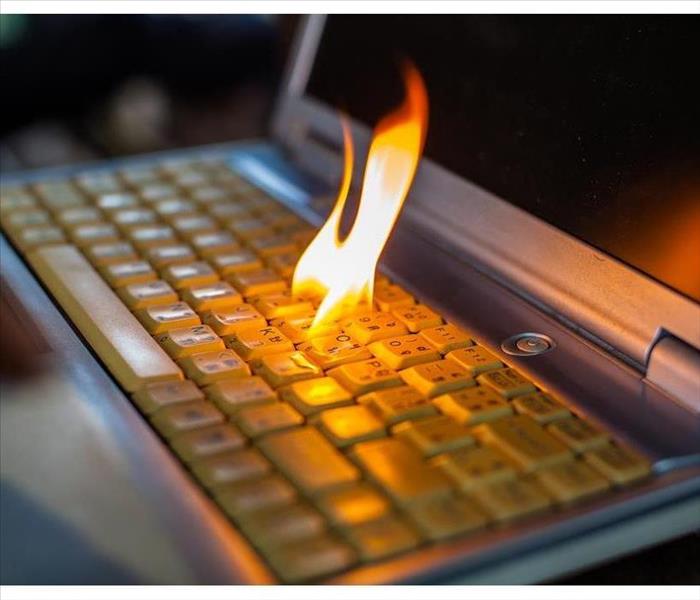 A regular or electrical fire can damage electronics.
A regular or electrical fire can damage electronics.
Smoke Damaged Electronics
An electrical fire, or any fire, can leave your electronics in disarray. While it is tempting to turn everything on and see if it still works, it is best to avoid powering on most items. There are elements of a fire that can be hazardous to your electronics, and that damage may become irreversible if powered on. It is best to leave the cleaning and testing to the professionals and avoid these common smoke damage pitfalls.
1. Avoiding Magnetic Charges
Though it may not be common knowledge, smoke does have a magnetic charge. This charge can short your laptops circuit board, or damage other machinery and appliances. To protect your laptop, you should take it in for a professional computer cleanup, letting the staff know about your concerns. Best case scenario, they save your computer; worst case, maybe they salvage your files.
2. Dealing with Black Film
A regular and electrical fire can leave a smoke residue on your electronics called black film. This film infiltrates the internal components of your items, insulating them and making them vulnerable to overheating. It is necessary to dismantle all parts and thoroughly clean them.
3. Removal of Acidic Soot
In addition to magnetic charges and black film, the remnants of soot on your electronics are acidic which can lead to degradation. This means that if the soot is not adequately cleaned off, your item’s life span will diminish, likely substantially.
4. Cleaning with Appropriate Equipment
While most businesses employ janitorial staff, it is important to note that electronics cleaning is a specialized field. Many janitors do not have the necessary tools or experience to clean electronics after a fire. You will likely want to hire a disaster restoration specialist in the Upper Montclair, NJ, area.
A regular or electrical fire can damage electronics. While the fire itself can be destructive, it is the smoke damage that does the most harm to these items. The intricate components and the variety of smoke, film and soot, make hiring a professional most beneficial.






 24/7 Emergency Service
24/7 Emergency Service






